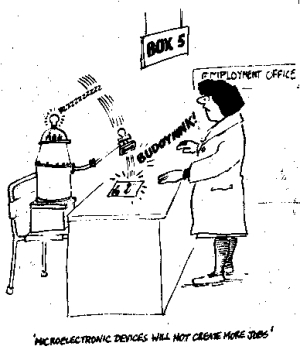
MIA > Archive > Harman > Machine
THE STRUGGLE over the new technology has already started. But that does not mean that it is going to take the form of one huge confrontation, that will last a few weeks or a few months and then be over.
Just as the new technology will take many years to reach all industries, so there will not be just one confrontation, but flare up after flare up.
Many individual battles will be lost, particularly at first, when workers are not fully aware of the scale of the threat.
But the very fact that the new technology is going to revolutionise the working lives of so many people means that over time it can lead to many more workers being involved in struggles.
The way such struggles are going to develop can be seen from what has happened in certain industries already.
 |
In Post Office telecommunications socialists first started warning about the effect of technical change ten years ago. For a long time theirs were voices in the wilderness. Yet over time, as workers began to see the new technology having an impact, these warnings began to be taken seriously.
The result was that from October 1977 to August 1978 the POEU completely banned new equipment, and in the summer of 1978 staged strikes, a total overtime ban and a work-to-rule – the first sustained industrial action in the 96 year history of the union.
The journalists’ union has traditionally been the least militant of the printing industry unions. When, four or five years ago a minority of militants began talking about the threat of new technology, again no one took them very seriously (there were even other militants who found it all a bit boring).
But reality soon started catching up with people, and at the 1978 NUJ conference a policy was passed on the new technology which, although far from perfect, was better than in any other print union.
We can expect a similar pattern in other unions. At the 1978 conference of the biggest civil service union, the CPSA, the hall was half empty during the debate on new technology. That is unlikely to be the case the next time it is discussed.
Socialists inside the trade union movement generally have to start a new campaign of propaganda about the dangers associated with the introduction of new technology. This will involve:
<< Last Chapter | Next Chapter >>
Top of the page
Last updated on 7 March 2010